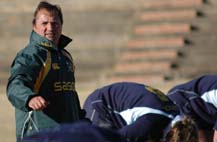Latest News Archive
Please select Category, Year, and then Month to display items
05 June 2018
Photo Supplied
 Archaeological excavations in the Wonderwerk Cave, north of Kuruman in the Northern Cape.
Archaeological excavations in the Wonderwerk Cave, north of Kuruman in the Northern Cape.
Research fellow Dr Lloyd Rossouw from the Department of Plant Sciences at the University of the Free State (UFS) recently published an article in the Nature Ecology and Evolution journal with Dr Michaela Ecker from the University of Toronto as lead author, and Dr James Brink, research fellow at the UFS Centre for Environmental Management. The findings described in “The palaeoecological context of the Oldowan-Acheulean in southern Africa” provides the first extensive paleoenvironmental sequence for the interior of southern Africa by applying a combination of methods for environmental reconstruction at Wonderwerk Cave, which have yielded multiple evidence of early human occupation dating back almost two million years ago.
Where water once was
The Wonderwerk Cave is found north of the Kuruman hills (situated in Northern Cape) a 140m long tube with a low ceiling. The surroundings are harsh. Semi-arid conditions allow for the survival of only hardy bushes, trees, and grasses. But during the Early Pleistocene, stepping out of the Wonderwerk Cave you would have been greeted by a completely different site, the researchers found. Using carbon and oxygen stable isotope analysis on the teeth of herbivores (Dr Ecker), fossil faunal abundance (Dr Brink), as well as the analysis of microscopic plant silica remains (phytoliths) excavated from fossil soils inside the cave (Dr Rossouw), the results show that ancient environments in the central interior of southern Africa were significantly wetter and housed a plant community unlike any other in the modern African savanna.
What difference does it make?
While East African research shows increasing aridity and the spread of summer-rainfall grasslands more than a million years ago, the results from this study indicate an interesting twist. During the same period, shifts in rainfall seasonality allowed for alternating summer and winter-rainfall grass occurrences coupled with prolonged wetlands, that remained major components of Early Pleistocene (more or less the period between one and two million years ago) environments in the central interior of southern Africa. That means our human ancestors were also living and evolving in environments other than the generally accepted open, arid grassland model.
Three more Kovsie staff members involved in Olympic Games
2012-05-30
 |
|
Dr Derik Coetzee
Photo: Supplied
30 May 2012
|
The South African men’s hockey team will practice on our Bloemfontein Campus from 28 May to 8 June 2012, and the team count on the assistance of three Kovsies to prepare them for the Olympic Games taking place in London later this year.
Dr Derik Coetzee, senior lecturer in the Department of Exercise and Sport Science and Head of our High Performance Centre, has been appointed conditioning coach of the team. He will be assisted by Colleen Jones and Riaan Schoeman, also from this department.
The UFS team and Mr Gregg Clark, the team’s coach, will work out a periodisation programme for the team, which will continue until the hockey finals at the Olympic Games. The programme includes the correct exercises, volume, intensity and number of exercise sessions per week.
This is not the first time that Dr Coetzee has assisted sports teams to prepare for important events. In 2007, he was the conditioning coach of the Springbok rugby team that won the World Cup in France. He was also the conditioning coach of the under-21 Springbok team in 2002 that won the Junior World Cup Tournament.
Dr Coetzee says it is a challenge to ensure that the team performs well at the Olympic Games. “The joy on the faces of the coach and players when they qualified in Japan cannot be described because many people thought they would not qualify.”
With the addition of Dr Coetzee, Ms Jones and Mr Schoeman, a total of six staff members from the UFS will be involved with the Olympic Games and the Paralympic Games. The other three are:
- Dr Louis Holtzhausen, Head of the university’s Department of Sports and Exercise Medicine, has been selected as team doctor for the more than 300 athletes that will represent South Africa at this year’s Olympic Games (in London).
- Ms Ebeth Grobbelaar, Assistant Director of the South African Testing Laboratory for Prohibited Substances at the UFS, was invited to be involved in the Drugs Control Centre in the unit against prohibited substances which will test sportsmen and -women during the games.
- Ms Hetsie Veitch, Head of the Unit for Students with Disabilities, has been invited to be a member of the Classification Panel at the final USA Paralympic athletics trials.